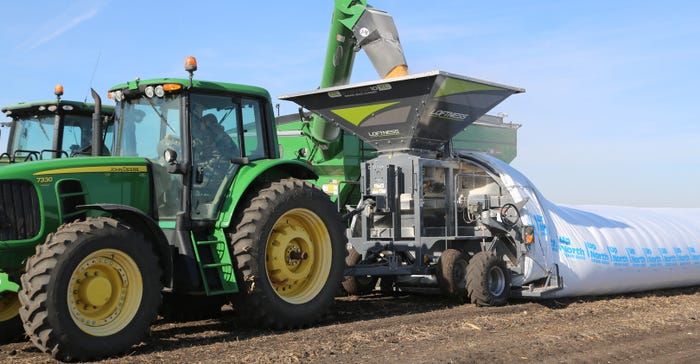
In recent years, grain bagging has become a popular practice for more farmers. Big crops and no place to put the extra corn at harvest when steel bins are full is the driving force. Grain bags have also proven themselves to be more than just a temporary grain storage solution. There are multiple reasons why farmers choose to bag some of their grain. Sometimes, the reasons have more to do with logistics than actual storage purposes.
To give you an idea, here are 13 of the top reasons why you may want to consider bagging grain this year. Wallaces Farmer asked Dave Nelson, senior vice president of sales at Loftness Manufacturing, to list the advantages he sees and hears from farmers. Loftness, a Minnesota-based company, sells bags and makes grain bag loaders and unloaders for use with the plastic bag system.
1. Established dealer networks. The practice of grain bagging originated in South America, due to the lack of bins and infrastructure for storing grain. However, grain bags have been successfully used in North America for over two decades. As a result, there are now more established and experienced dealer networks throughout the U.S. and Canada to offer grain bagging equipment, parts and support for producers wanting to bag grain.
2. Faster harvesting. When grain is bagged directly in the field, there is no more waiting for trucks to return from the elevator or from on-farm bins. This keeps the combines running, helping producers speed up harvest and minimize downtime.
3. Multiple loading options. Grain bag loaders have extra-large hoppers for accepting grain from combines and grain cart augers. They can also be equipped with swing-away augers for loading grain from semi-trucks. The variety of loading options helps make grain bagging equipment highly adaptable to all types of farming operations.
4. Unlimited storage capacity. When all of the bins on a farm reach capacity, grain bags offer the ability to add a virtually unlimited amount of storage. Producers can use this strategy to avoid piling grain on the ground or taking the excess to the elevator in the year of a bumper crop or when previous crops are still stored in the bins due to stubbornly low prices.
5. Convenient unloading. When bags are filled with grain in the field, they can be unloaded after harvest when it is more convenient, more labor is available, and trucking rates are more reasonable.
6. Reduced labor and truck needs. Fewer trucks are required for hauling when grain is being bagged in the field. Having fewer trucks helps reduce labor and freight costs at harvest.
7. No commercial storage costs. Grain bagging provides an excellent option for producers who wish to avoid costly storage at their local elevator but do not want to invest in building grain bins on their own farms.
8. Easy segregation. Grain can easily be segregated into different bags according to seed variety, moisture, protein content, etc. This strategy can help when blending or trying to collect a premium on high-quality grain. Organic, nonconventional and specialty crops can also be kept in separate bags to avoid contamination by other varieties.
9. Temporary wet corn storage. When harvesting wet corn, some producers choose to bag it immediately. Then, they unload and dry the corn later to help reduce bottlenecks at the grain dryer. However, keep in mind that the system, for longer-term storage, is designed to store dry grain. One drawback of bagging is you can’t aerate corn once it’s in the bag like you can when storing in a bin.
10. Marketing flexibility. Similar to storing grain in bins, grain bags give producers much more flexibility in their marketing programs. Grain can be stored in the bags until basis improves and prices recover from seasonal harvesttime lows.
11. Fast transfer rates. With today’s grain loading equipment, bags can be filled at rates up to 30,000 bushels per hour. This helps ensure there are no interruptions during harvest.
12. Protected environment from insects and disease. Once grain bags have been sealed, the oxygen level is reduced, and the concentration of carbon dioxide is increased. This environment virtually eliminates fungal diseases and insects without the use of chemicals. The air-tight environment also slows the natural metabolic process that leads to increased temperatures in grain, helping to maximize storage life.
13. Flexible placement. Grain bags can be placed on the farm, in the field or on any other suitable lot. They also offer a great option for grain storage on rented land, short-term contracts or any other situation in which fixed storage is not ideal.
For more information, visit loftness.com.
About the Author(s)
You May Also Like




